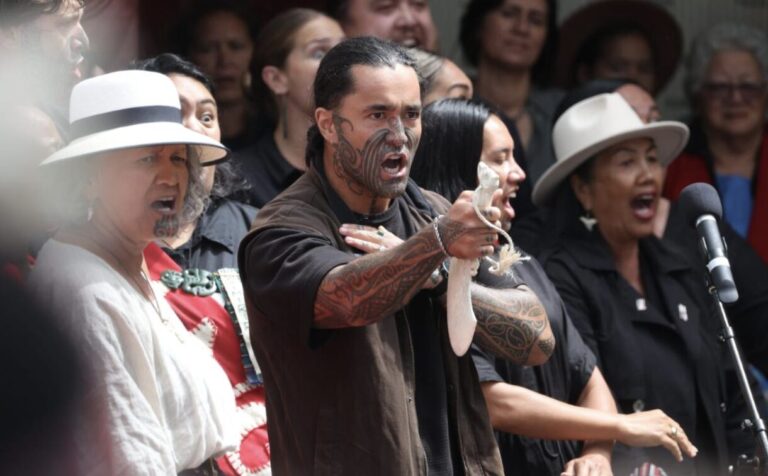Kumara Sutra: Maori – Indian love as a response to racism
“Curry-muncher!” he retorted apropos of nothing that I could understand. Then he said it again in the plural, “curry-munchers.” He said it loudly to gain attention from what I could surmise – he seemed to be revelling in saying it, like a child testing his luck. There were maybe four or five of us in the room at the time. We were doing something in relation to campaign activity at Act Party headquarters in Newmarket, stacking envelopes or planning something. It was 2003 or 2004 and I was the acting General Manager and in charge of these people. Someone – it might have been me – asked him what he was talking about. This enabled him to get in a few more of the same infantile epithets as he explained himself.
It occurred to me he was trial running the term rather than articulating anything genuine about an encounter with an Indian person. This guy was a Macedonian immigrant – a white guy, a European. He thought he had discovered a loophole in the English language that would allow him to wantonly use a derogatory term in a way or in an environment that was (somehow) permissible. He was attempting to acclimatise to the Pakeha-dominated social milieu. His derogatory expression was his attempt to try to bond with the majority culture by othering a minority group – an act of racial solidarity. Racism – the Pakeha handshake.
But no one else was repeating what he said. We acknowledged he was talking about Indian people but we weren’t saying what he was saying. There was Act’s “Asian Chapter” of Chinese and Koreans down the corridor, but there were no Indians at the office. That’s why he was saying it – there were no Indians present. At this point no one had said anything to him about the term itself, but going from the rant I was pretty sure if the Asians weren’t part of the outfit he would have been using terms against them too.
So, what to do? Being more than two decades after the fact we can now turn to AI for management support. My AI (MS Co-pilot) says what you would expect:
That’s a tough but important moment to handle well. Even if the targeted group wasn’t present, the impact of racist language still ripples through the workplace culture. […]
Step-by-Step Response Strategy: 1. Address It Promptly and Privately […] 2. Reaffirm Workplace Values […] 3. Document the Incident […] 4. Consider Formal Action […] 5. Educate and Prevent […]
Even if no one from the targeted race was present, others may feel unsafe, complicit, or alienated. Your response sets the tone for what’s acceptable—and what’s not. It’s not just about discipline; it’s about leadership.
And that’s exactly how I would approach that nowadays, yes, but twenty years ago my tactic was simplistic mirroring – reactionary. Just slam it right back in their face. They dished it out – so they got to take it – right? I described to the AI what I did in fact do in this case and asked if my approach was OK. Here is the response:
No, it’s absolutely not okay to use racist language—even with the intent of “teaching a lesson.” As a manager, your role is to model integrity, fairness, and professionalism. Responding to inappropriate behavior with more inappropriate behavior undermines your authority and can escalate harm, not resolve it.
Here’s why that approach backfires:
Why Retaliatory Language Is Harmful
It violates workplace standards […] It exposes you to liability […] It damages trust […] It reinforces harm […]
What You Can Do Instead
Be direct and firm […] Use restorative approaches […] Lead by example […].
AI models the collective academic wisdom of not fighting the bully, narking to the teacher, rigid rule-following and so on; but reality is often more properly governed by intuition not text book answers.
Here’s what I did. After he had finished his random racist rant there was a lull and I asked him where he was from again (I already knew): Macedonia (as in Northern Macedonia formerly the Former Yugoslav Republic of Macedonia – so I could have called him Latka who wasn’t even from a ‘real country’, but he might not have got the joke). Oh, fascinating. Macedonia. Say, what do you eat mainly in Macedonia then? He didn’t know what I meant. Well, what’s the national dish of Macedonia that everyone eats? Souvlaki. Ah, Souvlaki. I got him to say it a few times so I could get the pronunciation right. He seemed heartened and delighted at my sudden onset of curiosity about the cuisine of his Balkan homeland. He was so happy I was interested. He named some of the ingredients and the preparation etc. Souvlaki – that’s great.
“So… then you’re a Souvlaki-muncher aren’t you?” He looked at me funny so I had to say it a bit louder. He gave a sheepish laugh and we got back to work. Until maybe five minutes later when he mentioned “curry-munchers” again so I immediately shot back “Souvlaki-muncher – what are you saying?” and he said it again and immediately even louder I repeated that he was a Souvlaki-muncher and instead of saying his name referred to him as “Souvlaki-muncher”. There might have been a later incident that day or the following day when I did the exact same thing – as soon as he said that it would be thrown back in his face twice as loud so everyone can hear: “Souvlaki-muncher!”
After that no more problems. The message of inclusion was effectively delivered by this method because there was no repetition of it and apart from him being given only what he was putting out there was no harm to anyone. Peace in the valley. Loving words, tautoko katoa. Another successful resolution in real life by doing the exact opposite of what AI suggested.
These memories aren’t brought up merely as some perverse homily calculated to antagonise the hostile commentary at The Daily Blogabout ever having been connected with Act, it is to bring the abstract spectre of racism that politicians and the media refer to into real life examples.
The line between gauche insensitivity and outright racism is easily crossed, and the media as referee are quick to rule most as transgressions out of acceptable bounds. Usually the media can find someone, somewhere who will go on the record using the word “racism” in order to fit the narrative. Sometimes justified, sometimes not. The swirling dumpster fire of Takuta Ferris’s comments on the Labour Party using non-Maori in the Tamaki-Makaurau by-election has been both. It’s triggered off many other fires.
I think nothing wrong of non-Maori helping in a Maori electorate campaign. As someone supporting the original Maori Party and then the Mana Party we had non-Maori assistance and candidates etc, without anything being an issue. The closest I can remember there ever being a racial issue that caused tension was when Hone Harawira called for a division of the Maori members at the 2014 Mana convention to see where the Maori opinion was on joining an alliance with the Internet Party – and that was only because someone else handled it badly by rudely ordering the tau iwi out. But my background is urban and so while I thought nothing of a Labour Facebook photo that showed ethnic peoples out for Peeni Henare I can see why someone who represents a South Island electorate might view those matters with chagrin. I can also see why having non-Maori and immigrants in particular assisting is a legitimate concern. I can see that Labour boasting about how many immigrants they have to support them to try to take a Maori seat is problematic.
My impression of the initial post by Ferris was he was doing two things: criticising Labour for using non-Maori in a Maori electorate, and claiming Te Pati Maori was a genuine Maori party whereas Labour was not. Let’s go through these two things.
Labour should not have boasted about using foreign muscle in the first place and Ferris shouldn’t have mentioned it. However, Ferris’s post itself didn’t cross any line – far, far worse is out there (see below). On the second point: Is Labour not a genuine Maori Party? No it isn’t. Labour just need to suck up that fact and wear it because it’s true – painful and probably impossible to acknowledge publicly – but true: the Pakeha prevail every time when push comes to shove in Labour. The Foreshore and Seabed Act was a classic where the white cabinet and caucus shafted the Maori. Same with the ram raid bill Kiri Allen was forced to put through as Justice Minister that would imprison Maori children by lowering the age – the white cabinet overrides Maori again. Ask John Tamihere all about it – he was Lands Minister giving away Crown land to white High Country farmers when he was in Labour passing the Foreshore and Seabed Bill to take land off Maori. Labour is and will always sacrifice Maori for the others that is just reality and we all know it. Willie and Labour cannot argue against the facts and the record.
The argument from Labour must be how much more Maori gain from being inside their tent. It will be a weak argument I wouldn’t buy, but they have to make it. The Maori Party don’t have to prove anything – they are pono, tuturu and tino to the max – and we all know that because everyone is hating on them because they’re scared TPM will not compromise and sell out like the previous iteration did.
The difficulty for TPM has come from two places: a relentlessly anti media and a relentlessly anarchic political management which is entirely self-inflicted. I don’t think Labour have really damaged them at this point, they’ve only threatened. The media will be anti always but the internal mess is unnecessary and totally avoidable. Ferris’s midnight bong o’clock rock double-down was not a rant it was a rambling trail of non sequiturs as was JT’s rambling colonisation victimhood word salad on Waatea. None of what those two said made any sense. It was embarrassing listening.
Compounding Ferris and JT melting down was the TPM leadership of Rawiri and Debbie who folded like a serviette instantly and threw Ferris under the waka. Christ that was weak to admit racism, confessing with mea culpa’s all round, it undermined everything and it’s not true – or arguably not true. Ferris was being critical of Labour for using non-Maori, he wasn’t being critical of the non-Maori themselves – it was on Labour. To pretend he was being racist because he mentioned ethnicities was his second point – which was a note on semantics, presented in a pseudo-philosophic manner like he was Noam Chomsky or something that came across as sailing three spots to the wind. The leaders conceding racism where none was is thoroughly unwise and a scared, flaky move which combined with the Whip position being taken away from Mariameno Kapa-Kingi does not provide confidence. Oriini Kaipara as their sixth MP is set to join them, this should be a celebration not a circling of wagons.
And speaking of kraals, the Act Party are on the road from annoying to odious with their racialised rhetoric on socials spewing a near daily torrent of anti-Maori poison. I don’t know what chapters the Act organisation has these days – there used to be only the Asian Chapter for Chinese and Koreans. My log-in password was “MaoriChapter” – that’s as close to a Maori branch they ever had. So, given the ethnic basis of the Asian Chapter it is strange that Act should use ethnicity as a cudgel.
Anything to do with Maori is ethnicity and race according to Act. Polynesians maybe don’t exist? The idea of whakapapa and geneology don’t exist for them, Maori = race. And anything about race is bad. The performance is deeply hypocritical and wantonly damaging. Just this week are two illustrations of this racism in action from Act.
On Tuesday Parmjeet Parmar was on Twitter saying Maori shouldn’t have a right to NZ citizenship just because they were Maori. Yesterday Simon Court was on The Platform calling the kaffiyeh “terrorist garb” and a “tea towel” – which was repeated by their Leader, Rimmmer, on the tiles. Court was four square for Israel as usual, however the Jewish State he so proudly supports has a citizenship policy that says every Jew can become an Israeli citizen by dint of their… let’s get this right… race?… no?…only use that word for Maori, what about ethnicity? No?… only use that for Maori, so… religion? heritage? It is hypocrisy.
And as for Parmar’s continued despicable racism towards Maori we see the tension exemplified by our Souvlaki-muncher friend: as an immigrant what level of racism do I have to demonstrate to the white majority in order to be socially accepted by the white majority? Quite a lot it turns out because she has done a load of heavy lifting on behalf of the white superstructure and isn’t stopping. But this week was a massive deflection because as she sent out the toxic post against Maori the Adoption Amendment Bill was being rammed through the House under urgency to stop the Hindu adoption law of India being used to traffic child slaves. Yes the government had let this putrid situation go on until this week and yet we see no identification from Act and their acutely tuned racial radar of ethnicities and religions and countries that obviously do not share our values and have been a threat to “our” way of life. Silence when Indians are caught out, but a song and dance – a Bollywood-level extravaganza – when Maori are being made out to be the problem.
The two problems as I see them remain. Firstly, leaders have taken to victimhood and the political system rewards racial prejudice – that is an unsatisfactory mix. Secondly, the liberal value of “diversity” cannot be achieved without substantial immigration, but substantial immigration is necessarily colonisation and so is counter to the indigenous value of “decolonisation”. Over-laying the two problems are the lies and mythology and sensitivities which stymie any open discussion – for example the undeniable fact that without the million+ immigrants over the last 35 years there would be more Maori seats than today (maybe five more), and so the glib retort that immigrants are not a “threat” or “do not diminish” Maori power is simply false.
Dialling down the rhetoric and dialling up the facts may not get the result you want because the facts are themselves disturbingly raw. What we need now is love.






Chris Trotter has ostensibly come out in support of Takuta Ferris https://www.interest.co.nz/public-policy/135309/m%C4%81ori-seats-are-not-definition-everyone, which surprised and somewhat baffled me. So I went looking for the Machiavellian twist to his argument.
His thesis begins with the statement that “Labour is a Pakeha party” which is not true. Labour is a multi-ethnic party and always has been. He proceeds to argue that Labour should not be wading into elections in a Maori constituency which is strictly for Maori.
He then comes up with another false claim that “Those who subscribe to the vision of one big happy multicultural New Zealand family, and wish to participate in its elections, are required to enrol on the General Roll”.
That statement is of Trotter’s own invention. The truth is that if you have Maori whakapapa you can go on the Maori roll. If not you must go on the General roll. It has nothing to do with whether or not you “subscribe to a vision of one big happy multicultural New Zealand family”. Trotter is just being mischievous here.
He follows up with this: “Which raises an uncomfortable question: What are people registered on the General Roll doing involving themselves in an election that can only be decided by people on the Māori Roll?”
It is worth noting at this point that we (including Mr Trotter) don’t know that the folk in the Labour campaign photo were not on the Maori roll even if we might reasonably assume that they were not. The objection to the image was not an objection to the individuals pictured, nor did it question their individual credentials. The objection to the image was that it communicated and *was intended to communicate* the false idea that multiethnic or multicultural influence should be brought to bear in a Maori election.
Trotter’s final paragraph sums it up: “If Labour recognises no vital differences between Māori and General seats, then the principled political course would be to abolish Indigenous representation altogether. If, however, Labour sees the Māori seats as New Zealand’s response to the political marginalisation of Māori; an imperfect attempt to offset the devastating consequences of their conquest and dispossession by Imperial Britain, then maybe Labour shouldn’t be contesting them at all”.
Trotter presumably reasons that if Labour does not contest the Maori seats, then it will potentially lose a chunk of its Maori caucus, consequently lose interest in the Maori seats (as National has) and become what Trotter wrongly says it is now (“a Pakeha party”) with no reason to vote or campaign for the continuation of the Maori seats.
Those who want to retain the Maori seats, for whatever reason, will respond that candidates from Labour and every other party of any stripe should be free to contest the Maori seats but they can at the same time argue that there should no outside interference, and in particular no multicultural interference in the election process.
It is important to note that Takuta Ferris did not say that the Labour candidate should not be contesting the election. He merely asserted that Labour should not bring a multicultural influence to bear.
So although at first glance Chris Trotter might seem to be taking the side of Takuta Ferris in this debate, he is actually playing a more subtle game. That subtlety was lost on most of his regular supporters who thought that he was taking a stand for Maori rights, and so were provoked into their own familiar anti-Maori rants. Trotter’s real object was lost on them, which is probably no bad thing.
Immigration is the essence of colonization. Premier Julius Vogel said, quite bluntly, that mass immigration would do more to subdue Maori than a couple of regiments of British troops. Immigration is still being used to keep Maori on the back foot, but added to that, it helps to control any uppity gone-native Pakeha as well. Immigration is a tool of colonialist economic and political dominance, pure and simple.
Therefore immigrants should mind themselves as to how they behave and what liberties they choose to take, (as should we all). Most immigrants are blissfully unaware of the role that they are expected to play, and unconsciously do play, in the continuation of New Zealand’s colonialist system of government. Most of them have good will towards their fellow New Zealanders. All those who featured on the Labour Tamaki makaurau election poster included. Perhaps them more than any others. But while good intentions are to be respected they are not the end of the story. Immigrants need to acquire a degree of political awareness and an understanding of the unique history of Aotearoa if they are to play a positive role in our nation’s future. Too many of them rush to sign up to the ACT party (which is thoroughly and unashamedly colonialist) because they can relate to a global ideology which is premised on the idea that ignorance is a virtue, and those who presume to govern don’t need to understand their own nation, its history or its culture.
So to stop mass immigration is a sound policy, and to educate and assimilate the immigrants already present is a wise one.
Now to the controversial statements by Takuta Ferris and John Tamihere.
John Tamihere said ““It is wrong for other folk to politic in Māori seats because I don’t go over to their country, like the British Raj and destroy India. I don’t rage the Opium War as the British did with the Chinese. I don’t place all people from Africa into slavery like white Europe did.”
To paraphrase: “Maori did not colonize India. Maori did not try to force opium upon the Chinese people. Maori did not enslave the peoples of Africa. The British did all that. Therefore, people coming from those Asia and African nations should not allow themselves to be used by colonialists to intrude into Maori political affairs. They should respect Maori independence and dignity in the same way that Maori have respected the independence and dignity of Chinese, Indian and African peoples”.
I don’t totally agree with John’s position, but to me the argument above is irrefutable. I would just go a step further than John and say that the only people who should have been actively engaged in the Tamaki makarau by-election were the people of Tamaki makaurau electorate themselves. Not many people would agree with me on that, but in the future Aotearoa it will be recognised as a basic political principle. The perverse phenomenon of foreign or outside interference will be completely eliminated from the political system under rangatiratanga.
Let’s have a look at what Takuta Ferris said in his second, so-called “doubling down” public statement.
“Ferris also didn’t believe anyone would have had a problem with his comments had he made them in te reo Māori. He said the English language had been an “oppressor” of other ethnicities”
I think Takuta is right. He would know. If he had made the statement in te reo it would have come across differently. Why? Because speaking in te reo is not just a case of translating word for word from English. When one speaks English one speaks with the whole weight of English culture shaping the discourse. One thinks one is speaking one’s own thoughts, and of course in a sense one is, but in another sense one is articulating the ideas common to an entire culture. Te reo is informed by a different cultural understanding, and Maori speaking in te reo are more likely to tend towards the magnanimity of manaakitanga, not necessarily because they become any kinder, but because the language gives a confidence of their position in the system of things, and they are more aware of how their tipuna would receive their thoughts, even when they may not be overly confident in the language itself.
“They’re trying to make us vanish. They’re trying to make us disappear into just a small minority in our own country, whilst we fight for the damn seats that are there for us, expressly for us, and they’re there for us because the Pākehā at the time, and currently, know that Māori have unique rights as opposed to everyone else.”
Ferris said ““They’re doing it in plain daylight. This is why I say it blows my mind. They’re homogenising Māori.”
This idea of homogenisation is vitally important. It has been debated more sympathetically and at greater length on e-tangata https://e-tangata.co.nz/comment-and-analysis/two-takes-on-takuta/ but to be brief: It is questionable whether any ethnic minority wants to be homogenised, and it is a red line for Maori within their own country, Aotearoa. When “multiculturalism” becomes “Maori are just an ethnic minority in New Zealand like Brazilians or Sri Lankans or Iraqi” then Maori will not have a bar of it, because it really would amount to an erasure of Maori. Maori will keep their unique identity as first people of Aotearoa, just as all those other ethnicities will keep their unique identity as people that migrated to Aotearoa for all sorts of reasons bringing with them all sorts of cultural practices and values.
The position of Maori is unique in Aotearoa. No one can deny that. It is a matter of fact, not of belief.
There is more to be said on the subject of homogenisation, but I suggest that anyone interested goes to e-tangata and joins the discussion there.
The right of return for Maori is a tricky one. Most countries give right of return for only one, two or three generations. Go much past that and you are inviting half the world (with, say, 1/1024 Maori blood) to return to Aotearoa sometime next century.
I have another objection. Give Maori the right to return after two or three or four generations and they might not think so hard about leaving Aotearoa for the rest of their life, and raising their tamariki in another country. If we are to retain the national culture of Aotearoa there must be constraints on immigration and self-restraint with respect to emigration.
The colonialists know exactly what they are doing. They are making it next to impossible for Maori to survive in their own land. Consequently thousands of Maori leave for Australia. The colonialists then import labour from India, China and the Philippines. If that sounds like the Great Replacement Theory it is because British colonialism in particular has always worked on the basis of replacing the labour of indigenous peoples wherever that has been deemed necessary and possible.
Interesting points.
Here’s a suggestion- anyone, regardless of what their genes might say, who is objectively more Canadian than they are a New Zealander Maori or not despite being born in this country should have their citizenship stripped away. In this way, we can have a nice peaceful solution to David Seymour, with him simply being deported rather than facing the treason trial and harsh punishment he might otherwise be condemned to.
Tim wrote: “I think nothing wrong of non-Maori helping in a Maori electorate campaign”.
I do see it as being wrong. It is, by definition, “foreign interference”. If you don’t belong to an electorate, you should not be intruding into the process by which the people of that electorate select a leader or representative. I acknowledge that puts me offside with virtually everyone in the political system, because they all do it. They pile their people from all over the motu into marginal electorates at general elections, and national headquarters of every party blast every electorate with political messaging through radio, television and print media. (TPM might be something of an exception here – they may pretty well limit themselves to the Maori electorates. If TPM don’t explicitly barge into the contests in general electorates, that would suggest to me that they are not being racist, just respectful of a fundamental principle of democracy).
On the other hand “foreign interference” seems to be accepted as normal in the colonialist system of things. But the time will come when we have something more closely approximating a genuine democracy and we will look back and wonder why we tolerated all that blatant outside interference in other peoples’ decisions.
Multiculturalism has many negative effects for Maori and the proof is in the pudding with an influx of recent Asian immigrants and before P.I immigrants who culturally dominated Maori especially in Urban areas like Auckland where Māori journeyed from there Rohe (area) for work and competed with them for housing, work and social status in our own country. I am of the opinion that the immigrants from Asia are predominantly right leaning and will vote against Maori interest so it hard for myself to accept these people’s showing solidarity when Pakeha values & beliefs are the norm.